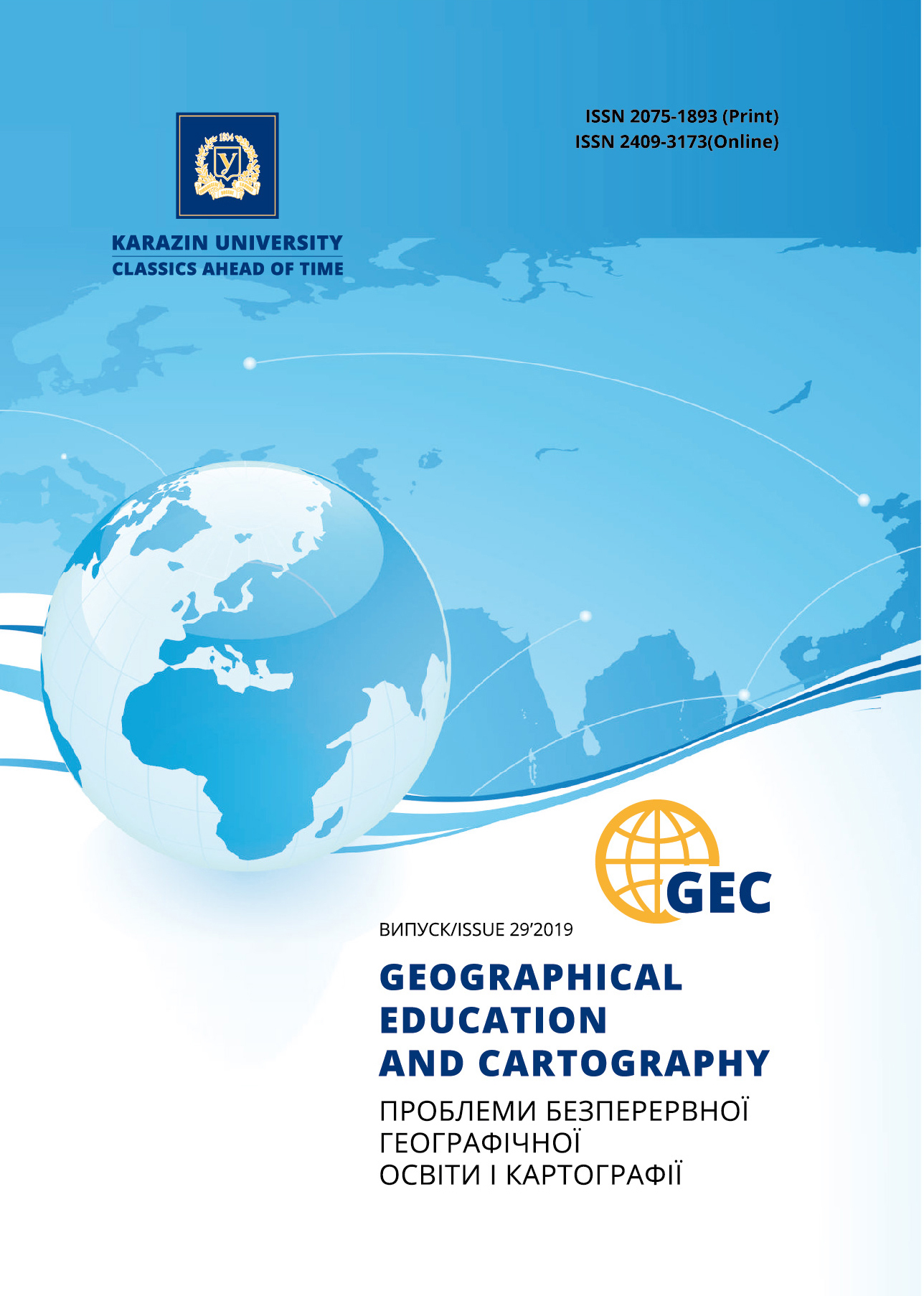Main directions in scientific research of continuous geographical education
Abstract
Introduction. The article notes that the Concept of continuous education in its modern form was first presented at the UNESCO forum in 1965 by P. Langrand, and later has been developed by many foreign and domestic scientists, including those related to geographical education. The Law of Ukraine «On education» (1991) proclaims continuity as one of the principles of modern education in the country. The Concept of continuous geographical education and its individual links are being developed and implemented now in Ukraine.
The purpose of this article is to reveal the main directions in scientific research of continuous geographical education.
The main material. Continuous geographical education (CGE) develops mainly as a phenomenon of practice and does
not have sufficient theoretical justification. The main directions in scientific research of CGE as a whole system are the following:
1st direction is the study of the systemic, holistic nature of CGE (preschool, school, high school, postgraduate). Between the stages of education there should be clear continuity objectives, contents, means, forms and methods of training. This follows from the principle of integration (in this case vertical integration).
2nd direction stems from the need for effective implementation of the principle of training individualization in the system of CGE. Educational institutions are now at the stage of intuitive search solutions.
3rd direction relates to the principle of creativity, the implementation of which should ensure the formation of a creative personality – the protagonist of continuing education.
4th direction is the scientific development of the communication problem in general and special (professional) education. This is also the rationale for the timely student choice of their future field of professional activities. This is the principle of pragmatism and differentiation of teaching in the system of CGE.
5th direction is concerned with the principle of the CGE dynamism. It is important to develop a dynamic approach to learning – the ability to assimilate the new achievements of science and technology (this approach is highly unusual in the lower levels of education).
Conclusions. Based on the experience of Kharkiv regional and University center for continuous geographical education, it is considered that the directions of research outlined in the article are significant, although this list can be expanded.
Downloads
References
Lengrand, P. (1970). Introduction to Lifelong Education. Paris: The UNESCO Press, 99.
Dave, R.H., ed. (1976). Foundations of Lifelong Education. Some Methodologikal Aspekts. Paris: Pergamon Press, 15-55.
Hummel, Ch. (1977). Education Today for the World of Tomorrow. Paris, UNESCO, 200.
Zhemerov, O.O., Levy`cz`ky`j, I.Yu. (1996). Deyaki aspekty` organizaciyi i funkcionuvannya regional`nogo centru bezperervnoyi geografichnoyi osvity` ta metody`ky` vy`kladannya geografichny`x dy`scy`plin [Some aspects of organization and operation of the regional centre of continuous geographical education and methods of teaching geographical disciplines]. Source of Pedagogical Skills, 13, 17-18.
Zhemerov, O.O., Levy`cz`ky`j, I.Yu. (1997). Bezperervna geografichna osvita [Continuous geographical education]. Ukrainian Geographical Journal, 2, 70-72.
Shy`shhenko, P.G. (2000), Bezperervna geografichna osvita: dy`dakty`chno-vy`xovni aspekty`, zasoby` navchannya [Continuous geographical education: didactic and educational aspects, means of education]. The Problems of Continuous Geographical Education and Cartography, 1, 6-7.
Koval`chuk, I. (2001). Dosvid i shlyaxy` realizaciyi bezperervnoyi geografichnoyi osvity` Ukrayiny` [Experience and ways of implementation of continuous geographical education in Ukraine]. Bulletin of the Lviv National University. Ser. Pedagogical, 15, 289-297.
Shy`shhenko, P.G., Munich, N.V. (2002). Geografichna osvita: problemy` aktualizaciyi v sy`stemi shkola-vuz [Geographical education: problems of actualization in the school-University system]. The Problems of Continuous Geographical Education and Cartography, 3, 11-16.
Zhemerov, O.O. (2003). Naukovi osnovy` reformuvannya bezperervnoyi geografichnoyi osvity` [Scientific basis for reformation of continuous geographical education]. Modernizaciya i reformuvannya seredn`oyi, vy`shhoyi i pislyady`plomnoyi geografichnoyi ta kartografichnoyi osvity` v krayinax SND: dosvid, problemy`, perspekty`vy` [Modernization and reform of secondary, higher and postgraduate geographic and cartographic education in CIS countries: experience, problems, prospects: materials of the XII Intern. sciences’.-method. seminar]. Vinnitsa: Anteks-U Ltd, 8-10.
Kornyeyev, V.P. (2003)/ Sy`stema neperervnoyi geografichnoyi osvity` i pry`ncy`py` yiyi pobudovy` [System of continuous geographical education and principles of its construction Modernizaciya i reformuvannya seredn`oyi, vy`shhoyi i pislyady`plomnoyi geografichnoyi ta kartografichnoyi osvity` v krayinax SND: dosvid, problemy`, perspekty`vy` [Modernization and reform of secondary, higher and postgraduate geographic and cartographic education in CIS countries: experience, problems, prospects: materials of the XII Intern. sciences’.-method. seminar]. Vinnitsa: Anteks-U Ltd, 11-13.
Zhemerov, O.O. (2005). Olimpiadni zavdannya z rozv’yazannyamy` [Olympiad tasks and solutions]. Xarkiv: Osnova, 256.
Zhemerov, O.O. (2007). Geografichni olimpiady` [Geographic Olympiad]. Xarkiv: Osnova, 256.
Levickij, I.Ju., Peresad’ko, V.A., Rusnak, T.V., Zhemerov, A.O., Bajnazarov, A.M. (2011). Istorija stanovlenija nauchno-metodicheskih seminarov na kafedre fizicheskoj geografii i kartografii Har’kovskogo nacional’nogo universiteta im. V.N. Karazina [History of formation of scientific and methodical seminars at the Department of physical geography and cartography of V.N. Karazin Kharkiv National University]. Geography and Ecology at School of XXI Century, 9, 34-40.
Zhemerov, A.O. (2012). Geografija [Geography]. Novejshij polnyj spravochnik shkol’nika: 5-11 klassy. V 2-h T. [The newest complete directory of pupil: forms 5-11. 2 T.]. T.1. Moskva: Jeksmo, 484-576 (+ 1 CDRom).
Memorandum nepreryvnogo obrazovanija Evropejskogo Sojuza (2000) [Memorandum of Continuing Education of the European Union]. Lisbon. Available at: http://www.znanie.org/jornal/n2_01/mem_nepr_obraz.html





